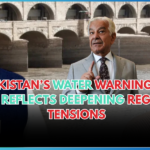Over the last few days, tensions have grown between India and Pakistan. The reason? An increased number of incidents along their border and revived concerns regarding Indian-occupied Kashmir. Now, Pakistani leaders are signaling that they may bring the issue before the United Nations Security Council (UNSC), something done gingerly in international organizations.
Pakistan’s Permanent Representative to the UN, Munir Akram, was not reluctant to speak his mind during his address to the media. He highlighted what he called “alarming developments” in the region and proposed that Pakistan could call for an emergency meeting of the UNSC to deal with the matter.
The grievances are not just on the alleged cross-border firing, but there is also domestic work conducted within Kashmir where human rights groups raised severe humanitarian issues. Pakistan, Akram explains, is wary that more inaction from the international community could make things worse.
India remains adamant that Kashmir is an entirely internal matter. New Delhi has long complained of so-called “external interference,” most notably from Pakistan. Indian officials also claim recent military attacks are in defense and against what they assert are threats facilitated by players along the border — a charge Pakistan continues to deny.
The two nations have fought a number of wars over Kashmir since their independence, and the issue still remains unresolved despite decades of negotiations, agreements, and international appeals for peace.
While this is not the first time that Pakistan has threatened to involve the UNSC, the difference here is the diplomatic situation. With shifting alliances, global economic pressure, and other current conflicts within the rest of the world, nobody knows how high a priority the world powers now believe South Asia should be.
But Pakistani authorities assert that concerns involved are more profound than territorial politics. They refer to the defense of universal human rights, protection of regional stability, and prevent further militarization of the conflict theater. They also refer to reports of increasing troop deployments, communication disconnections, and silencing voices of politics in Kashmir as reasons for international concern.
Whether or not the UNSC would follow through on a hypothetical appeal by Pakistan remains to be seen. Traditionally, the Council has resisted intervention, suggesting bilateral talks instead. But Pakistan would like to hope for some change — perhaps that world leaders are now apt to acknowledge the risk of blowback.
In the end, ordinary citizens on both sides of the border are the ones who must endure the uncertainty. For them, each diplomatic move has real-world consequences. And in a region with a nuclear backdrop, even minor errors can have lasting consequences










